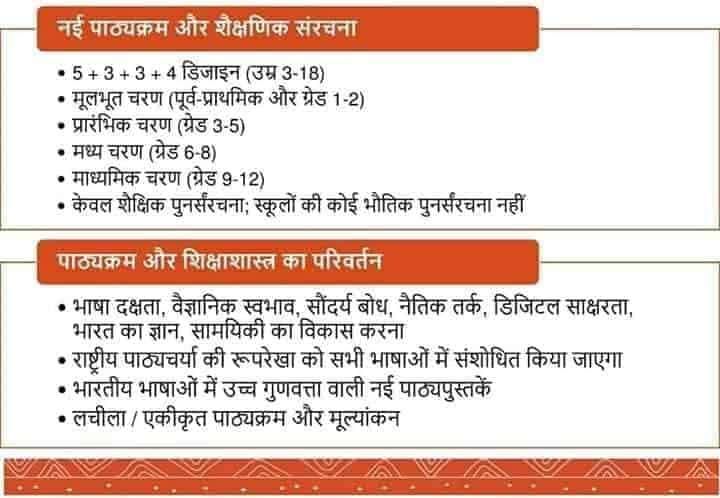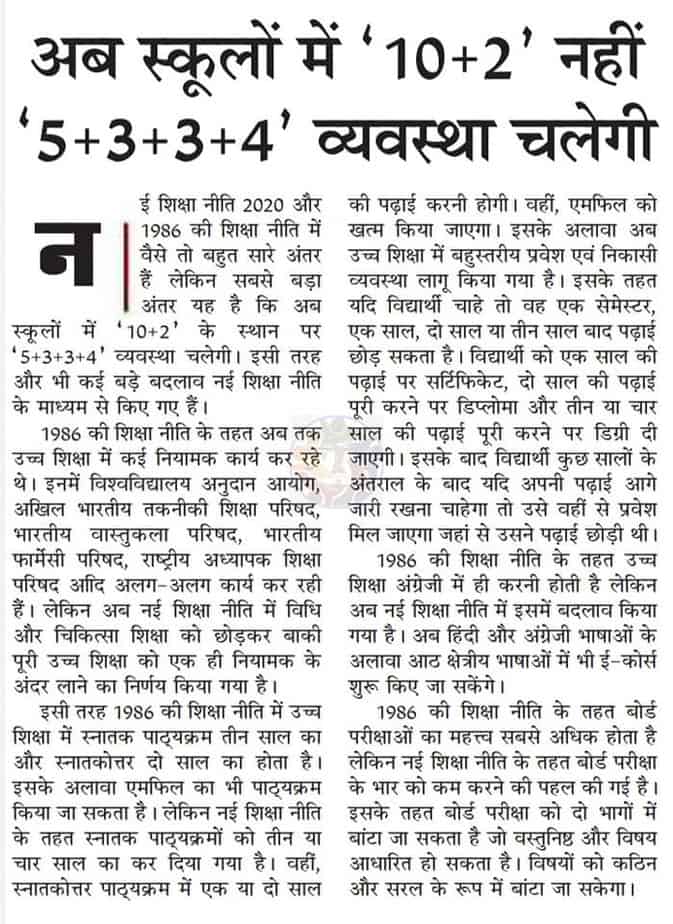National Educational Policy (NEP): Union cabinet paved the way for transformative reform in school and higher education system by launching the New National Education Policy (NEP) on 29th July 2020. They also renamed MHRD as Ministry of Education. After the old national education policy which was launched way back in 1986, this is the first education policy of 21st century that has replaced 34 years old education policy. The new NEP is based on four pillars which are Access, Equity, Quality, and Accountability. In this new policy, there will be a 5+3+3+4 structure which comprises 12 years of school and 3 years of Anganwadi/ pre-school replacing old 10+2 structure.
NEP 2022 Timeline
UGC Chairman said that the due to COVID-19 pandemic affected the implementation of NEP but they assure that once the condition normalizes then it will be implemented at a faster pace.
By 2030 the minimum education qualification for teaching will be a 4 year integrated B.Ed course.
Education Minister Ramesh Pokhriyal Nishank said that they have no plan to revise the reservation norms under NEP.
Meghalaya Chief Minister said that they will form a task force for the implementation of New education Policy and after the constitution of such force Meghalaya will become the first state in the country that will implement this NEP
Through this new education scheme, they are trying to bring more than 2 crore students into the mainstream and with the help of this, they aim to achieve 100% GER (Gross enrollment ratio) from pre-school to secondary by the end of 2030. Through this NEP 2020 government is looking forward to making India a “global knowledge superpower” and it will be only done by making education system for schools and colleges more flexible, holistic, and multi-disciplinary which will bring out their unique capabilities.
Major Reform in National Education Policy (नई शिक्षा नीति 2020 कब से लागू होगी
- Students now take a school examination which was conducted by the appropriate authority in grades 3, 5, and 8.
- Board examination for 10th and 12 will be continued but will be redesigned with the aim of holistic development.
- PARAKH (Performance assessment, review, and analysis of knowledge for holistic development) a new national assessment platform will be set up.
- Mathematical thinking and scientific temper coding will start from class 6
- Vocational education will start in school from 6th grade which also includes internships.
- The 10+2 structure will be replaced by 5+3+3+4…
- The new system will have 12 year of schooling and 3 years of pre-school/Anganwadi
- Till grade 5th this policy will emphasize local language/regional language/mother-tongue as the medium of instruction.
- At school and higher education, Sanskrit will also be included at all levels as an option for students which includes three language formulas.
- As an option, literature of India and other classical languages will also be available.
- No student would be forced for any Language.
- Higher education will receive flexibility in subjects.
- There will be multiple entries and exit points with appropriate certification for higher education.
- UG programmed can be of 3 or 4 years with multiple exit options with appropriate certification in this period like certificate will be awarded after 1 year, advanced diploma after 2 years, degree after 3 years, and bachelor with research after 4 years.
- Academic bank of credit (ABC) will be created in which digitally academic credit earned by students will be stored through different HEIs and it will be transferred and counted for final degree.
- The curriculum in all subjects has been reduced to its core essentials.
- Through this, they focus on critical thinking, discovery, inquiry, discussion, and teaching based on analysis and holistic learning methods for education.
- Regulator for higher education will be light but tight.
- Focus on E-learning so that they can reduce their dependency on textbook
- Under the new policy education will get 6% of GDP earlier it was 1.7% which will definitely boost the education system.
- By the end of 2040, they aimed that all HEIs will become multidisciplinary institutions and each of them will have 3000 or more students.
- In next 15 years, college affiliation will be phased out.
- At least one large multidisciplinary HEI should be built-in or near every district by 2030.
- Aim to achieve 100% youth and adult literacy.
- NTA will offer a common entrance exam for admission in HEIs
#NEP2020 Fact: Do you know this was the 3rd NEP policy first policy came in 1968 and the 2nd one came in 1986 but it was amended in 1992.
What is the vision of New National Education Policy?
“The NEP 2020 envisions an India Centred education system that directly contributes to the evolution of our nation enduring into an equitable and vibrant knowledge society by giving them a top-class quality of education.”
Through this NEP, our country’s education system and research facility will become more robust and with the help of this, students who spent thousands of dollars on education in foreign countries will get global standards in line with India.
NEP 2020
ECCE (Early childhood care and education) Foundation of learning:
Through this policy, the children who are in the age group of 3 to 6 year has access to free, safe, high quality, developmentally appropriate care, and education by 2025. Because right now there is a severe learning crisis in India because children are enrolled for pre-primary but they fail to attain basic skills.
- Restructuring of school curriculum and pedagogy to new 5=3+3+4 pattern
- The new curricular structure was designed in the interest of learners at different stages of their development such as 3 to 8, 8 to 11, 11 to 14, and 14 to 18 years.
- The Foundation stage will be of 5 years: 3 years of pre-primary and grades 1, and 2
- The preparatory stage will be of 3 years: Grades 3, 4, and 5
- Middle or upper primary will be of 3 years: Grades 6, 7, and 8
- High or secondary stage will be of 4 years: Grades 9, 10, 11, and 12
- All stages mentioned above will incorporate Indian and regional traditions, ethical reasoning, socio-emotional learning, quantitative and logical reasoning, digital literacy, computational thinking, scientific tamper, languages, and communication skills properly.
Education in Mother Tongue/Regional Language
As we know young children grasp new things quickly when we taught in their own language instead of some other language which they are not used to, and this policy also recognizes the same thus they added a point in this new policy that children up to grade 5 will be taught in their mother language but it can also prefer to grade 8 if required.
- For this, textbooks will also be made available in their language but if somehow it was not possible to provide, the language of interaction between teacher and students will be their home language.
- From grade 1 onwards young children will get exposure to two to three languages which may increase their speaking proficiency, interaction, and ability to recognize the same by grade
- Higher education plays an important role in improving human well-being and developing India and through this NEP they aim to increase their GER from 26.3% to 50% by 2035, and around 3.5 cr new seats will also be added to higher education institutions.
- Under this, UG education could be of 3 or 4 years with numbers of entry and exit options.
- Multidisciplinary education and Research University will be set up of global standards.
- HECI (Higher education commission of India) will be the only body for entire higher education (except medical and legal education)
- HECI will have 4 independent verticals such as NHERC (National higher education regulatory council) for a directive, GEC (Genera education council) for standard setting, HEGC (Higher education grants council) for sponsoring, and NAC (National accredition council) for recognization.
- Globalization of higher education.
- An academic bank of credit will be established in which credit earned by the students during their academics from different HEIs could be stored and transferred at the time final degree.
- National research foundation will act as a peak body that fosters a strong research culture and builds research capacity covering higher education.
- The importance of basic knowledge of various livelihood and life skills such as gardening, woodwork, pottery, electric work, and others
- They aimed that by the end of 2025 they have at least 50% of learners from school and higher education who have to get exposure of vocational education.
B.Ed. will be of 4 years
Under this new and inclusive national curriculum framework for teacher education which will be formulated by NCTE with the help of NCERT, by the end of 2030 the minimum qualification for teachers will be a 4 year B.Ed. degree program. For stand-alone teacher education institutes, inadequate standards strict action will be taken against them.
Students Financial Aid
The national scholarship portal (NSP) will be expanded to support, encourage children and their progress will be tracked so that they can receive scholarships. Private HEIs will be encouraged so that they can offer several studentships and fellowships to their children.
No hard separation of streams under NEP 2022
Every student will get the opportunity to engage in arts and humanities as well as in the study of arts and science and social science because of this no hard separation going to be done between ‘curricular’ and ‘extra-curricular activities’ or ‘co-curricular activities
- Every school subject will be considered as curricular rather than extra or co-curricular which includes yoga, sports, dance, music, sculpting, woodworking, gardening, and electric work.
- NCERT will prepare syllabi and textbooks as per the NCF (national curriculum framework) so that these subjects could be incorporated into the curriculum which SCERTs (State councils of educational research training) in states may edit, rewrite, and supplement as per their needs.
- Physical education will be incorporated strongly throughout their curriculum with a consideration that what is interesting and safe at each age.
- Also, there is no hard separation between ‘vocational’ and ‘academic’ stream because they wanted every student will get an equal opportunity to develop both capabilities
नई शिक्षा नीति में हिंदी


How teachers will be Recruited under NEP?
Under the new National Education Policy, if there is a shortage of teacher who speaks given languages, in that case, special efforts will be made and the scheme will be rolled out to recruit teacher including retired teachers who can speak the local language required.
Elective Foreign Language
In secondary school children can opt for the foreign language of their choice which could be French, German, Spanish, Chinese, and Japanese and this will only be an elective and not in place of the three language formula.
Higher Education Under New National Education Policy
College Affiliation Under NEP 2020
The affiliation of colleges will be phased out in 15 years and a mechanism will be established for granting graded autonomy to colleges. And after some time it is presumed that every college will develop into a self-governing degree provider or an intermediary of a university.
नई राष्ट्रीय शिक्षा नीति 2020 हिंदी में पढ़ने के लिए यहां क्लिक करें
Focus on Vocational Studies at the School Level
In 12th five year plan from 2012-2017, it is estimated that not more than 5% of Indians from the age group of 19 to 24 have received formal vocation education which is too low if we compare it to the other countries like USA 52%, Germany 75%, and South Korea 96%. That’s why under this policy every child from grades 6 to 8 must learn at least one vocational or more





No comments:
Post a Comment